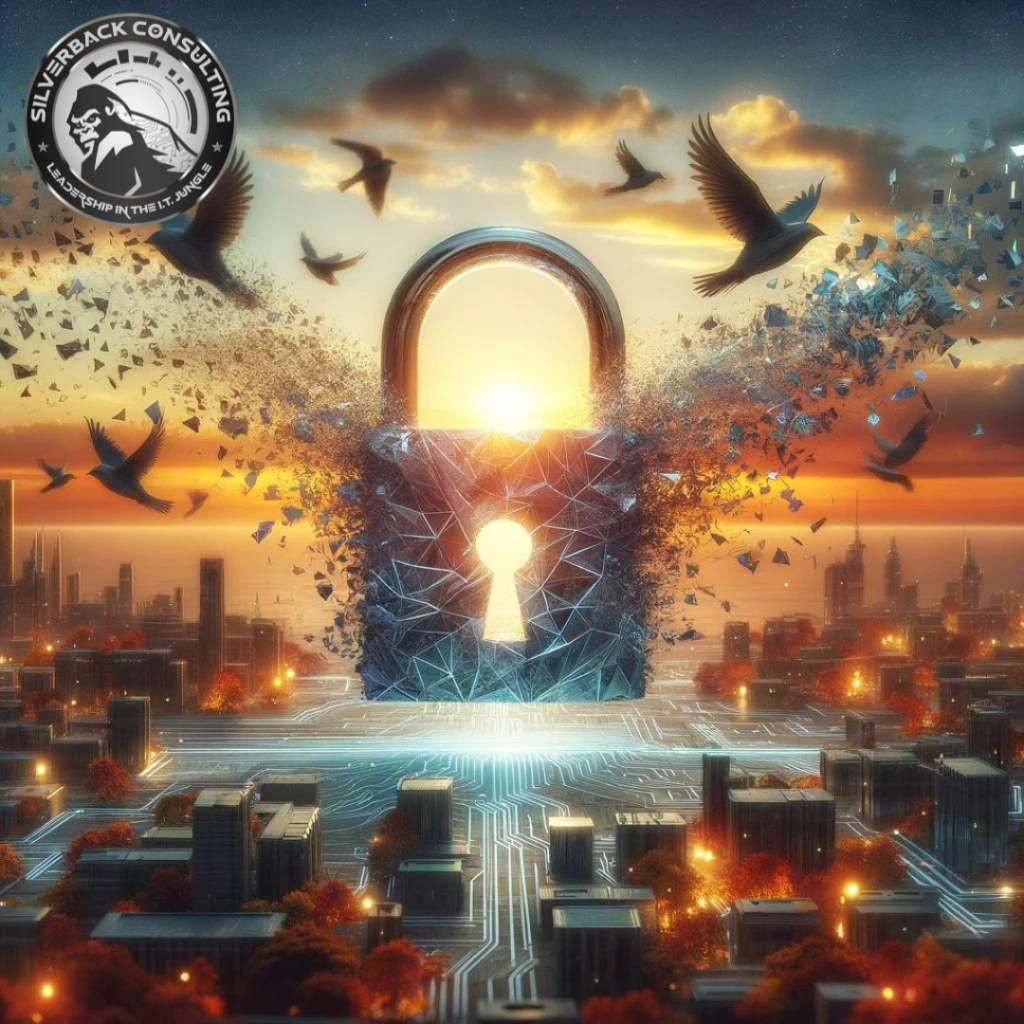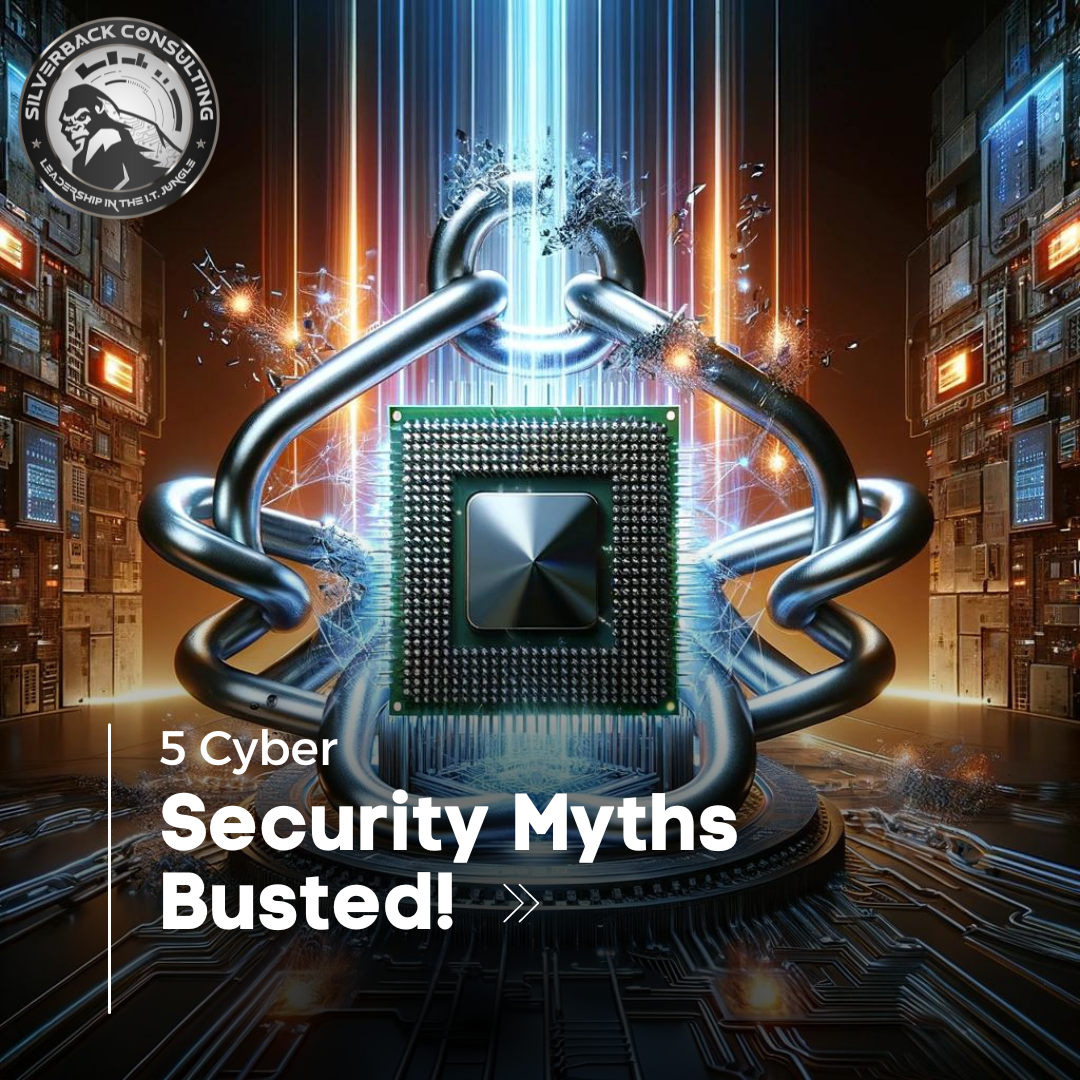Introduction
In today’s digital age, where every aspect of our lives is intertwined with online spaces, the significance of cyber security is undeniable.
Yet, as the ocean of cyber advice swells, so does a tide of myths and misconceptions, this leaves many to navigate the waters of cyber risks with either a false sense of safety or an undue sense of dread.
It’s crucial we tackle these cyber security myths busted, not through the lens of technical jargon, but in clear, simple English that demystifies the complexities and speaks directly to everyone.
Think of cyber security as the shield guarding the gateway to our digital existence, with myths acting as hidden fissures through which bad actors and malicious software easily infiltrate. Let’s mend these breaches, casting light on the truth to fortify our defenses against the ever-evolving cyber risks.
Myth #1: Only Large Companies Are Targets

The notion that cybercriminals exclusively target large corporations is a dangerous myth. This fosters an illusory sense of safety among small and medium enterprises as well as individuals, leading them to overlook vital safeguards. In truth, the situation is more egalitarian: every piece of data holds value, and smaller entities often present less of a challenge, thus becoming more appealing to attackers.
Much like a thief might opt for an unlocked home rather than a heavily secured bank, cybercriminals seek the easiest route. Recognizing that we are all potential targets is crucial. With this understanding, proactive measures can be taken to protect our online presence, no matter our digital footprint’s size, especially in the digital realm.
Myth #2: A Strong Password Is Enough
Relying solely on a strong password is akin to locking your front door but leaving the windows wide open. Passwords represent merely a single component within an overarching cyber security framework.
For instance, phishing attacks have the capacity to circumvent even the most robust passwords by deceiving individuals into willingly surrendering their credentials.
Additionally, the evolving complexity of brute-force attacks demonstrates that not even intricate passwords are completely secure.
A holistic approach to security is essential, incorporating elements such as two-factor authentication and the routine updating of passwords. Awareness of the myriad ways cyber attackers can gain access to your sensitive information is crucial.
Myth #3: Antivirus Software Offers Full Protection
Believing that antivirus software shields you from all cyber threats is a major Cyber Security Myth Busted. Antivirus is crucial but not foolproof against the sophistication of modern cyber threats.
Effective cyber security requires a layered defense strategy, including firewalls, intrusion detection, and education on safe online practices.
Regular software updates further reinforce this defense, addressing vulnerabilities that could be exploited by cybercriminals. It’s essential to understand that comprehensive protection evolves with the threat landscape, emphasizing the need for more than just antivirus solutions.
Myth #4: Cybersecurity Is Solely a Tech Issue
Believing that cybersecurity is exclusively a concern for IT professionals underestimates the role that every individual plays in maintaining digital safety. Cybersecurity is not just about implementing the latest technologies; it’s about fostering a culture of awareness and vigilance.
Mistakes made by people continue to be a primary reason for security violations. Simple actions, such as not clicking on suspicious links, using secure networks, and being mindful of the information shared online, can significantly mitigate the risk of cyber attacks.
Educating employees and individuals about their role in cyber security is just as important as the technology used to defend against attacks.
Myth #5: All Websites Are Equally Secure
Assuming all websites offer the same level of security can lead to complacency and increased risk. Just as physical neighborhoods varies in safety, so too does the digital landscape.
Websites without HTTPS encryption, for instance, are more vulnerable to intercepting data. Moreover, reputable websites can be compromised and their security measures bypassed. It’s crucial to exercise caution, look for signs of security (such as SSL certificates), and use discretion when providing personal information online.
Understanding Cyber Threats
Grasping the nature and variety of cyber threats is essential for effective defense. Cyber threats evolve constantly, driven by the dual forces of technological advancement and the ingenuity of cybercriminals.
By staying informed about the latest types of cyber attacks and understanding their potential impact, individuals and organizations can tailor their security measures to be both robust and resilient.
The Human Element in Cyber Security
Human behavior often represents the weakest link in the cyber security chain. Training and awareness programs that emphasize the importance of vigilance can significantly reduce the risk posed by phishing scams, social engineering attacks, and other tactics that exploit human psychology.
The Evolution of Cyber Threats
As technology advances, the techniques used by cybercriminals evolve accordingly. Staying ahead of these evolving threats requires a commitment to continuous learning, investment in new security technologies, and a proactive stance towards cyber hygiene.
Practical Steps for Enhancing Your Cyber Security
Enhancing cyber security doesn’t have to be overwhelming. Simple, practical steps like regular software updates, cautious email practices, secure backups, and the use of VPNs can collectively build a formidable defense against cyber threats.
Conclusion

Busting Cyber Security Myths is essential in our collective effort to safeguard against the myriad of cyber threats that loom in our increasingly digital lives. By dispelling these common myths, we equip both individuals and organizations with the knowledge to implement more effective security measures, protecting against malicious attacks with greater efficacy.
These cyber security myths busted serves as a clarion call to all of us, highlighting the importance of multifactor authentication, robust security software, and a keen awareness of external threats. In understanding that cyber security is a shared responsibility, we underscore the need for vigilance, continuous education, and a proactive stance in our defense strategies.
As we navigate through the digital age, let’s remain committed to debunking misconceptions and strengthening our defenses, ensuring a safer online environment for everyone.
FAQS
Are free antivirus programs sufficient for protecting my computer?
Free antivirus programs can offer a basic level of protection, but they may not provide the comprehensive security features needed to defend against all types of cyber threats. It’s often beneficial to invest in a reputable, paid antivirus solution that offers a broader range of protection.
Can using a VPN protect me from all cyber threats?
While VPNs are effective at securing your internet connection and safeguarding your privacy online, they are not a cure-all for every cyber threat. A VPN should be part of a multi-layered security strategy.
Is it safe to use public Wi-Fi if I have antivirus software installed?
Using public Wi-Fi poses risks, even with antivirus software installed. Public networks are often unsecured, making them hotspots for cybercriminal activity. If you must use public Wi-Fi, using a VPN can add an extra layer of security.
How often should I change my passwords?
It’s recommended to change your passwords every three to six months and whenever you suspect they may have been compromised. Additionally, using unique passwords for different accounts enhances security.
Can social media be a risk to my cyber security?
Yes, social media can pose significant risks to your cyber security. Oversharing personal information, clicking on suspicious links, and using weak passwords can all lead to security breaches. It’s important to use social media wisely and adjust privacy settings appropriately.
Stop Believing the Myths. Start Securing Your Business.
Misinformation can be just as dangerous as a cyberattack. Silverback Consulting helps businesses like yours replace myths with facts and build a rock-solid defense against real-world threats.
🛡 Let’s protect what matters most: your data, your reputation, your future.
Call us now at (719) 452-2205 to speak directly with a cybersecurity expert, or use the form below to get started today.
Silverback Consulting
303 South Santa Fe Ave
Pueblo, CO 81003
719-452-2205
support@silverbackconsulting.us
“Leadership in the I.T. Jungle”




